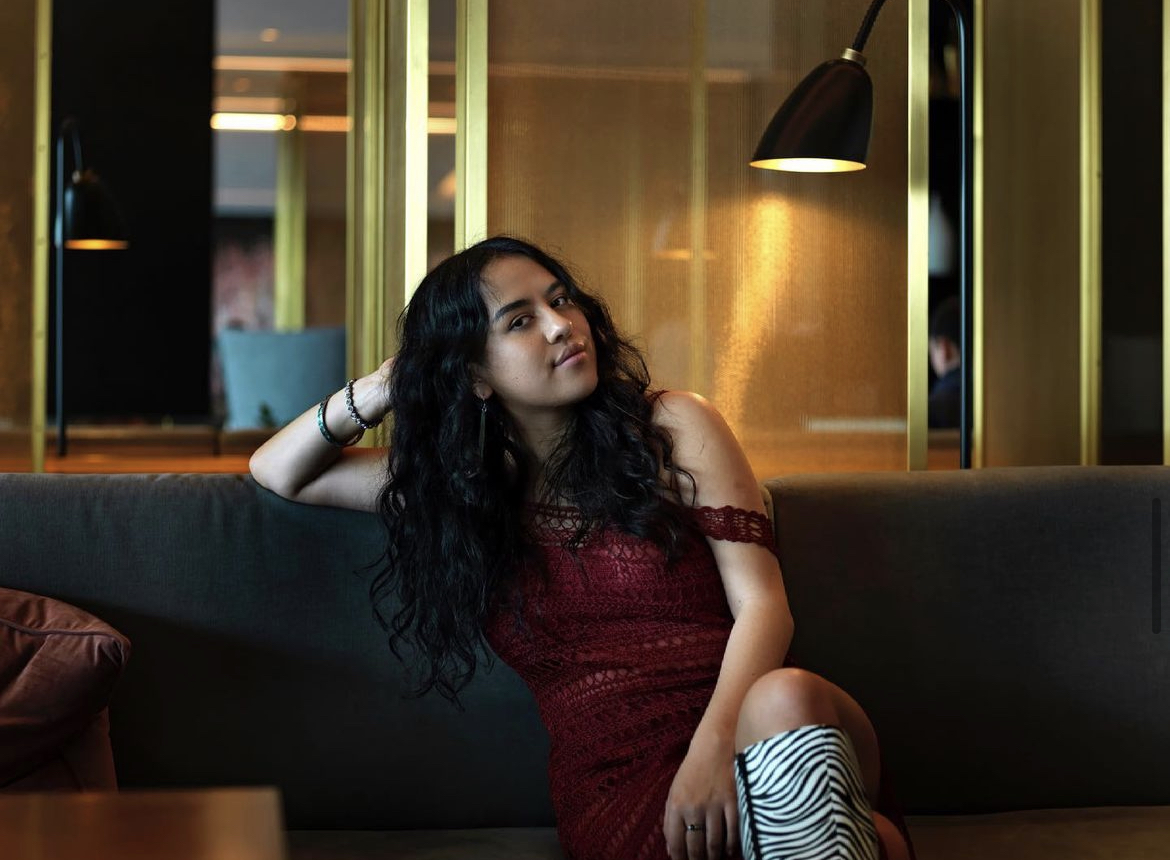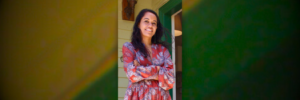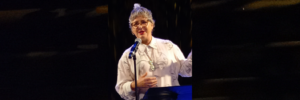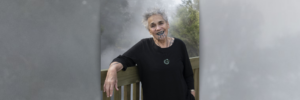
Photo credit: Jane Ussher
Tayi Tibble (Te Whānau ā Apanui, Ngāti Porou) is a writer, a 90’s baby and a fashion icon living in Wellington. She has a Masters in Creative Writing from the International Institute of Modern Letters, Te Herenga Waka, where she was the recipient of the Adam Foundation Prize. Her first book, Poūkahangatus, won the Jessie Mackay Best First Book of Poetry Award. Her second collection, Rangikura, was published in 2021. Both Tibble’s books have been published for international audiences, and in 2023 she was the first Māori writer to have work published in The New Yorker.
Congratulations on your books being published overseas, this is a huge accomplishment! Your books speak to your experiences as a young wahine Māori in Aotearoa, how does it feel to have these works and your Māoritanga opened up to a new, international audience? What has the response been from indigenous writers abroad?
Thank you! It’s been a freaking trip!! It feels exciting and nek level, though if I’m being honest it hasn’t come without doubts too. I’m super grateful for the opportunities and experience of course, but being away from Aotearoa can be challenging. My work is so rooted here, and I do write for our people who have an inherent and deeper understanding of my poetry — they understand the references and the essence of what it means to be Māori. I’ve worried that international audiences won’t understand a lot of my work because of its cultural context, and when I have been reading overseas, I have to give a lot of context in my preamble, which I don’t have to do at home. Though lowkey I’ve kind of been liking it, I feel like a custodian of ancient knowledge relaying the most basic stuff ahahaha.
I guess I also have a bit of residual 1800s colonial trauma, and worry a bit about being marched out to perform for audiences like a zoo animal, and at times in certain situations, I’ve sort of felt like the random poet from New Zealand, and kind of like I’m annoying to everyone. But mostly that’s just like, mental illness, and I don’t think my worries have too much basis in reality to be honest. Most people who read poetry are smart and curious regardless of their whakapapa, but you know the doubts come up when you’re far away and by yourself. I’ve kind of wondered like aye?? What’s going on? Who is this for? What is the purpose? Does this matter? I can still get quite whakamā sometimes.
But this last trip along the West Coast really changed things for me, and the way I feel about getting published internationally, and largely, that had to do with connecting with indigenous writers over there like Tommy Orange and Sasha La Pointe. They just really embraced and made space for me. They understand the work, see it as important, and as part of this wider network of indigenous writers, reclaiming our stories and making offerings towards the betterment of our future, and now, I have a better sense of how I can fit and actually be a part of the writing scene over there, and on a global level. Plus when I was in LA, I spent a lot of time by myself on the beach, just hanging out with the Pacific Ocean, and I was thinking about our voyaging history, especially in relation to my coastie tribes, and I thought naw actually, the most indigenous, Māori, Polynesian thing I can do is travel across the moana, share what I know, learn, and bring new stories home. I’m just carrying on a journey we have been doing for thousands of years.
How important is connection and community with writers at home, whilst travelling and taking up so many exciting and unique overseas opportunities?
It’s very important to me. We as Māori get our kaha from our people. It’s been a big but challenging year. I don’t always feel excited for myself, but when the people around me are like, no Tayi this is so cool, you’re doing really well and you got this, it makes me lift my chin up and really look around, feel grateful for the opportunities I have, and feel excited to take up more. Some people think that representing Māori is a pressure, but I think of it as such a privilege these days. It makes it easier to put yourself out there and go big, when you know it’s not just for you, there are people behind you, counting on you to do the mahi and do it well.
Who are Rangikura’s whanaunga? Who helped you bring this book into Te Ao Mārama?
The books I was inspired by at the time were The Tradition by Jericho Brown and Wife in Reverse by Hala Alyan. I was drawn to the romantic but withheld quality of their writing, and I wanted the tone of Rangikura to be similar. I was also inspired by 2000s Nesian Mystik and the Deceptikonz, because I love their sort of, modern Māori, polyswag world-building. I was also inspired by my friend group of creative wahine. I’m endlessly awed by the mahi they do, how generous and brave they are, and especially towards the end of Rangikura I wanted to write poems that could be karakia for us, to help us feel hot and be strong.
You’ve written some stunning pieces about your Nan and Whaea tīpuna. What do you think or hope your mokopuna will one day be writing about their future Kui Tayi?
Honestly, I’d like to be recognised in my specific way as a healer and a connector. So many of us experience disconnection and the pain it causes — I know that’s true for my whanau — so I hope my writing plays a part in connecting my future descendants with their ancestors, just like the stories my grandmother told me connected me with mine. Actually, I don’t mind what they say about me as long as they are brave and proud of who they are. I hope they’ll want to raid my archive of clothes though, and make those little TikToks like ‘styling my grandmother’s vintage clothes’ cos that’s the future hope I use to justify my present spending lol.
Last year you made a cameo in Lorde’s ‘Solar Power’ music video and you recently collaborated with Huffer on a clothing line featuring some of your most iconic kupu from Rangikura, what would your dream fashion or music collab be?
I really want to be a thot in a music video tbh, like wear something tiny and shake my flat ass lol. I don’t even care for who at this rate — hmm actually hopefully my own. I would really like to continue with my fashion girl journey, cos fashion is my passion equal to writing and I really want to put you bitches on and push the bougie native agenda. My fave designers atm are AKNA, Diesel, Blumarine, Jaded London, Y Project, Dion Lee, Prada and Miu Miu. Like notice me aye? It would be so different because I would wear their stuff with my pounamu dahaha!
What projects are you working on now or hope to be working on in the future?
Right now I’m working on a long-form essay about the Pacific Ocean, and honestly it could almost be a book at the rate I’m going. It’s kind of a series of ocean associations, our voyaging histories, it’s about journeys, poly club trauma and unpacking sexuality and desire as a mana wahine. I really want to write fiction, but it’s hard as & I feel dumb as hell. The third poetry collection has um, some poems, and I want to make music and write a film.
What tips do you have for building relationships in the Māori writing community?
I’m going to answer this like a round-about koro, but honestly just be yourself. There’s so much Māori visibility at the moment and that’s amazing, and while I think it’s obvious there is so much diversity and nuance among us, I also noticed people struggle with comparing themselves to other Māori — perhaps they feel pressure from other Māori — and then put pressure on themselves and think there is a right or specific way to be Māori and there’s not. I don’t know. I guess I’ve just sort of observed people who look as though they think their identity is something they will arrive at, like, if I learn the reo, and spend time on the whenua, do everything right and tika, sing to my river, I’ll finally be worthy of my whakapapa and connection with other Māori, but it’s like sis, you already are. Like, you don’t have to perform your whakapapa for anyone, other Māori included. Our whakapapa isn’t just knowing your ancestors back to Hawaiki, but also accepting what you don’t know. It’s acknowledging the disconnection colonisation caused and being okay with that — that’s a valid whakapapa too.
That said, whatever feels authentic and heartening to you, do it. All this is to say, I think the best way to build relationships in the Māori writing community is to be who you are. You don’t have to be perfect. You don’t have to do too much. If you’re genuine you will attract genuine people. Plus, it’s okay not to get along with everyone, even though that can feel scary. We’ve been scrapping since pre-contact and that just comes with the territory of being a fierce as fuck people. That said, most people are nice and want to connect and feel strong together too. We are the most loving and welcoming people too. And also like, read other Māori writing and go to events and stuff obviously.
Which book by a Māori author have you read lately that you loved and what did you love about it?
Tauhou by Kotuku Titihuia Nuttall and Kōhine by Colleen Maria Lenihan — they’re speaking to me because they’re both about Māoritanga and indigeneity in a foreign context, which has been my journey this year, and of course they’re beautiful, generous and talented — both the books and the authors.
Keep up with the adventures of Tayi on IG: @paniaofthekeef




